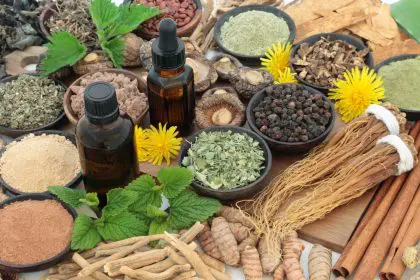Anxiety manifests as a complex interplay of physical sensations, racing thoughts, and overwhelming emotions that can significantly diminish quality of life when experienced regularly. While occasional anxious feelings represent normal responses to stressful situations, persistent anxiety interferes with daily functioning and creates cascading health impacts throughout the body. The search for effective management approaches has led many toward natural alternatives that address anxiety’s underlying mechanisms without the potential side effects associated with conventional medications. Recent research reveals several promising natural interventions supported by clinical evidence that offer new possibilities for those seeking complementary approaches to anxiety management.
Vitamin D: The sunshine nutrient with mood-balancing effects
The connection between vitamin D and mental wellbeing continues strengthening through emerging research that highlights this nutrient’s critical role in mood regulation and anxiety reduction. Large-scale studies involving thousands of participants demonstrate consistent correlations between adequate vitamin D levels and reduced anxiety symptoms across diverse populations.
The mechanism behind vitamin D’s anxiety-reducing effects involves its role in regulating neurotransmitter function and reducing inflammation within the brain. Vitamin D receptors appear throughout brain regions involved in emotional processing, suggesting direct modulatory effects on neural circuits that govern anxiety responses. Additionally, vitamin D helps regulate the hypothalamic-pituitary-adrenal axis, which controls stress hormone production and plays a central role in anxiety disorders.
Clinical evidence suggests that supplementation providing approximately 1,600 milligrams daily for at least six months yields measurable improvements in anxiety symptoms, particularly among individuals with previously low vitamin D levels. This timeframe allows sufficient duration for cellular processes dependent on vitamin D to normalize, explaining why brief supplementation periods often show inconsistent results.
Beyond supplementation, practical strategies for improving vitamin D status include regular sun exposure during middle daylight hours and consuming vitamin D-rich foods like egg yolks, fatty fish, and fortified dairy products. For those in northern climates or with limited sun exposure, supplementation may provide the most reliable approach to maintaining optimal levels throughout the year.
When considering vitamin D supplementation specifically for anxiety management, working with healthcare providers to establish baseline levels through blood testing helps determine appropriate dosing and monitor effectiveness over time. The relationship between initial deficiency severity and symptom improvement highlights the importance of personalized approaches rather than standardized dosing protocols.
Magnesium: The calming mineral for nervous system balance
Magnesium stands out among natural anxiety remedies for its direct effects on neural excitability and neurotransmitter regulation. This essential mineral serves as a natural calcium channel blocker, helping regulate electrical activity within the brain and preventing the excessive neuronal firing associated with anxiety states.
The anxiety-calming mechanism of magnesium involves multiple pathways, including increasing gamma-aminobutyric acid (GABA) availability—the primary inhibitory neurotransmitter that dampens excessive neural activity. Magnesium also regulates glutamate binding to NMDA receptors, preventing overstimulation that contributes to anxiety symptoms. These actions collectively create a calming effect on the nervous system that manifests as reduced physical tension and mental agitation.
Clinical research demonstrates that magnesium supplementation produces the most significant benefits among individuals with existing deficiencies, which affect an estimated 50% of the general population. Forms like magnesium glycinate and magnesium threonate show particular promise due to their superior bioavailability and ability to cross the blood-brain barrier effectively, allowing direct action within the central nervous system.
Dietary approaches to increasing magnesium intake include emphasizing dark leafy greens, nuts, seeds, legumes, and whole grains. However, modern agricultural practices have reduced the magnesium content in many foods, making supplementation increasingly relevant for achieving therapeutic levels. Typical effective dosages range from 200-400mg daily, with benefits often appearing within 2-3 weeks of consistent use.
The safety profile of magnesium makes it particularly appealing as an anxiety management tool, with digestive discomfort representing the primary side effect at higher doses. This mild adverse effect profile contrasts favorably with many conventional anxiety medications, explaining magnesium’s growing popularity as a first-line approach for mild to moderate anxiety symptoms.
Vitamin B6: The neurotransmitter production enhancer
Vitamin B6 in its active form, pyridoxal-5-phosphate (P5P), serves as an essential cofactor for enzymes involved in synthesizing neurotransmitters that regulate mood and anxiety states. Research indicates that higher doses than typically recommended for general health may provide specific benefits for anxiety reduction.
The anti-anxiety effects of vitamin B6 primarily stem from its role in producing serotonin and GABA—key neurotransmitters with calming properties. B6 helps convert the amino acid tryptophan into serotonin and glutamate into GABA, essentially supporting the brain’s natural anxiety management systems. Without adequate B6, these conversion processes become inefficient, potentially contributing to anxiety symptoms even when other precursors are abundant.
Clinical evidence suggests dosages around 100mg daily may yield meaningful anxiety reduction, particularly among young adults experiencing stress-related anxiety. This dosage exceeds standard nutritional recommendations but remains within safety parameters for short-term use. Longer-term high-dose supplementation should occur under healthcare supervision to monitor for potential nerve-related side effects that can occur with extended high-dose use.
Food sources rich in vitamin B6 include poultry, fish, organ meats, potatoes, and chickpeas. However, achieving therapeutic levels for anxiety management typically requires supplementation beyond dietary intake. When selecting B6 supplements, forms like pyridoxal-5-phosphate offer advantages through direct bioavailability without requiring conversion in the liver.
Combining vitamin B6 with magnesium may enhance effectiveness for anxiety management, as these nutrients work synergistically in neurotransmitter production pathways. This combination appears particularly beneficial for anxiety that worsens during hormonal fluctuations, suggesting potential applications for premenstrual and perimenopausal anxiety patterns.
Omega-3 fatty acids: Anti-inflammatory brain protection
The role of inflammation in anxiety disorders has gained significant recognition, with evidence indicating that inflammatory processes within the brain contribute to both the development and maintenance of anxiety symptoms. Omega-3 fatty acids, particularly eicosapentaenoic acid (EPA) and docosahexaenoic acid (DHA), provide potent anti-inflammatory effects that may help reduce anxiety by addressing this underlying mechanism.
These essential fatty acids become incorporated into cell membranes throughout the nervous system, improving membrane fluidity and neurotransmitter receptor function. Additionally, omega-3s generate anti-inflammatory compounds called resolvins and protectins that actively combat neuroinflammation associated with chronic stress and anxiety states. This dual action of improving neural communication while reducing inflammation creates comprehensive benefits for anxiety management.
Clinical research demonstrates dose-dependent effects, with amounts exceeding 2,000mg daily showing the most consistent anxiety reduction benefits in controlled trials. Lower doses, while beneficial for general health, typically fail to reach the threshold needed for measurable anxiety improvement. The ratio between EPA and DHA appears significant, with higher EPA formulations showing superior results for mood and anxiety compared to DHA-dominant products.
Dietary sources of omega-3s include cold-water fatty fish like salmon, mackerel, and sardines, along with some plant sources like flaxseeds and walnuts. However, plant sources provide alpha-linolenic acid (ALA) rather than direct EPA and DHA, requiring conversion in the body that proves inefficient for many individuals. For therapeutic benefits specific to anxiety management, marine-sourced supplements typically provide more reliable results.
When selecting omega-3 supplements for anxiety, considerations should include overall potency, EPA:DHA ratio, and product freshness to prevent oxidation that reduces effectiveness. Third-party testing verification helps ensure products remain free from contaminants like heavy metals that could potentially counteract benefits through neurotoxic effects.
Ashwagandha: The adaptogenic stress resilience builder
Ashwagandha has emerged as one of the most thoroughly researched adaptogenic herbs for anxiety management, with multiple clinical trials supporting its effectiveness for reducing symptoms across various anxiety patterns. As an adaptogen, ashwagandha helps the body maintain homeostasis during stress exposure rather than simply suppressing symptoms, potentially addressing root causes of anxiety rather than merely treating its manifestations.
The anxiety-reducing mechanisms of ashwagandha involve cortisol regulation, GABA receptor modulation, and antioxidant effects within the nervous system. By normalizing elevated cortisol levels associated with chronic stress, ashwagandha helps prevent the detrimental effects of persistent stress hormone exposure on brain regions involved in emotional regulation. Simultaneously, compounds in ashwagandha called withanolides appear to enhance GABA receptor sensitivity, creating effects similar to anxiety medications but through natural pathways.
Research indicates dosages around 600mg daily of standardized extract taken consistently for 8-10 weeks produce significant anxiety reduction comparable to some conventional medications but without associated side effects. These benefits appear most pronounced for generalized anxiety and stress-related anxiety rather than panic disorders or acute anxiety states, suggesting different mechanisms than fast-acting pharmaceutical interventions.
When selecting ashwagandha supplements, the extraction method and standardization level significantly impact effectiveness. Root-based extracts standardized to contain 2.5-5% withanolides generally show the most consistent results in clinical studies. Traditional preparations like ashwagandha churna or the use of ashwagandha in warm milk may enhance absorption and effectiveness through synergistic compounds.
Safety profiles from clinical studies indicate ashwagandha remains well-tolerated by most individuals, with mild digestive symptoms representing the most common side effects. However, those with autoimmune thyroid conditions should exercise caution due to ashwagandha’s potential effects on thyroid hormone levels. Similarly, ashwagandha may interact with sedative medications and thyroid replacement therapy, necessitating healthcare provider consultation before use in these contexts.
Valerian root: The ancient herbal tranquilizer
Valerian root has maintained its position among the most widely used botanical anxiolytics for centuries, with modern research increasingly validating traditional applications for anxiety management. This herb primarily functions through enhancing GABA activity in the brain—the same mechanism targeted by benzodiazepine medications but achieved through natural compounds that work more gently with fewer side effects.
The active compounds in valerian include valerenic acid and valerenol, which inhibit the enzyme that breaks down GABA, allowing this calming neurotransmitter to remain active longer. Additionally, valerian contains GABA itself, which although poorly absorbed directly, may contribute to its overall calming effects. Other compounds in valerian appear to bind directly to certain GABA receptor sites, creating mild sedative effects that help reduce both the physical and psychological manifestations of anxiety.
Clinical evidence supports valerian’s effectiveness at dosages ranging from 400-900mg of standardized extract, with benefits typically emerging after 2-4 weeks of consistent use. While valerian can provide acute calming effects for some individuals, its most reliable benefits develop through cumulative action over time, making it more suitable for ongoing anxiety management than for immediate relief of panic symptoms.
Valerian proves particularly effective for anxiety accompanied by sleep disturbances, addressing this common anxiety complication through its mild sedative properties. This dual action on both daytime anxiety and nighttime sleep quality creates comprehensive benefits for individuals experiencing anxiety-related insomnia that can otherwise create a self-reinforcing cycle of increasing symptoms.
Preparation methods significantly influence valerian’s effectiveness, with standardized extracts showing more consistent results than dried herb preparations. The characteristic unpleasant odor of valerian comes from volatile compounds that contribute to its therapeutic effects, making encapsulated forms preferable for many users while still preserving medicinal properties.
Chamomile: The gentle anxiety alleviator
Chamomile represents one of the most accessible anti-anxiety herbs, offering substantial benefits through both tea preparations and more concentrated extract forms. This gentle herb provides significant calming effects without creating sedation or cognitive impairment, making it suitable for daytime use when functional alertness remains necessary.
The anxiety-reducing properties of chamomile stem from flavonoid compounds, particularly apigenin, which binds to benzodiazepine receptors and creates mild anxiolytic effects without the side effects or dependency risks associated with pharmaceutical agents targeting these same receptors. Additional compounds in chamomile provide anti-inflammatory and antioxidant effects that may help address underlying physiological contributors to anxiety states.
Research demonstrates that chamomile extract at dosages between 1,500-2,000mg daily produces clinically meaningful anxiety reduction when taken consistently for 8 weeks. While chamomile tea provides some benefits, the concentration of active compounds typically remains too low in tea form to achieve the therapeutic dosages used in successful clinical trials, explaining why extract forms show more consistent results in research settings.
The gentle nature of chamomile makes it particularly suitable for anxiety that manifests with digestive symptoms, as this herb simultaneously calms the nervous system and soothes the digestive tract through local anti-inflammatory effects. This dual action helps address the gut-brain connection often involved in anxiety manifestations that include digestive distress.
Safety profiles from clinical studies indicate chamomile remains well-tolerated by most individuals, with allergic reactions among people sensitive to plants in the daisy family representing the primary concern. Chamomile also exhibits minimal interaction risk with most medications, though those taking blood thinners should consult healthcare providers due to natural coumarin compounds that may enhance anticoagulant effects.
Lemon balm: The mood lifter with cognitive benefits
Lemon balm offers unique benefits among anti-anxiety herbs through its dual action of reducing nervous tension while simultaneously enhancing cognitive function and mental clarity. This combination proves particularly valuable for addressing anxiety that impacts concentration and work performance.
The mechanisms behind lemon balm’s anxiety-reducing effects involve inhibition of the enzyme that breaks down GABA, similar to valerian but with less sedation and more pronounced cognitive benefits. Lemon balm also contains compounds that modulate acetylcholine receptors involved in attention and memory, explaining its traditional reputation for enhancing mental performance while calming nervous tension.
Research supports lemon balm’s effectiveness in reducing anxiety symptoms when used at dosages of 300-900mg of standardized extract containing at least 5% rosmarinic acid. Benefits typically emerge within 1-2 hours of administration and may last 4-6 hours, making lemon balm suitable for targeted use during anticipated stressful situations as well as for ongoing anxiety management.
The cognitive-enhancing properties of lemon balm make it particularly appropriate for anxiety that manifests with brain fog, mental fatigue, or attention difficulties. This specific action distinguishes lemon balm from more sedating anti-anxiety herbs and explains its traditional use for “nervous exhaustion” where both calming and restorative effects are needed simultaneously.
Preparation methods significantly influence lemon balm’s effectiveness, with fresh preparations generally providing more potent effects than dried material due to the volatile nature of some active compounds. Tinctures and standardized extracts typically provide more reliable results than tea preparations, though freshly brewed tea from recently harvested leaves can deliver noticeable benefits when consumed regularly.
Lifestyle approaches: The foundation of natural anxiety management
While supplemental approaches offer valuable tools for anxiety management, sustainable improvement typically requires concurrent lifestyle modifications that address underlying contributors to anxiety states. These foundational practices create physiological conditions that naturally reduce anxiety vulnerability while enhancing resilience to stressors.
Regular physical activity provides one of the most thoroughly documented non-pharmacological interventions for anxiety reduction, with effects comparable to medication for some individuals. Exercise influences anxiety through multiple mechanisms including endorphin release, reduced muscle tension, improved sleep quality, and enhanced brain-derived neurotrophic factor (BDNF) production that supports healthy neural function in regions regulating mood and anxiety.
Breathing practices represent another powerful anxiety management tool accessible without any special equipment or cost. Techniques emphasizing extended exhalation activate the parasympathetic nervous system, directly countering the sympathetic dominance characteristic of anxiety states. Regular practice of specific patterns like 4-7-8 breathing (inhale for 4 counts, hold for 7, exhale for 8) creates both immediate calming effects and cumulative benefits through nervous system retraining.
Dietary patterns significantly influence anxiety levels through effects on inflammation, gut microbiome composition, blood sugar stability, and nutrient availability for neurotransmitter production. Anti-inflammatory dietary approaches emphasizing whole foods, adequate protein, healthy fats, and minimal processed ingredients provide the nutritional foundation for optimal nervous system function and anxiety resistance.
Sleep hygiene plays a crucial role in anxiety management, with bidirectional relationships between sleep quality and anxiety symptoms. Prioritizing consistent sleep scheduling, creating restful sleep environments, limiting evening screen exposure, and implementing calming pre-sleep routines all contribute to anxiety reduction through improved sleep architecture and duration.
Mind-body practices including yoga, tai chi, and various forms of meditation demonstrate substantial anxiety-reducing effects through combined influences on nervous system regulation, attention control, and physiological relaxation responses. Regular engagement with these practices creates progressive benefits that extend beyond practice sessions into daily life functioning.
Implementing an effective natural anxiety management approach
Creating an effective anxiety management strategy using natural approaches requires thoughtful integration of various components tailored to individual needs, anxiety patterns, and underlying contributors. This personalized approach yields superior results compared to generic supplement regimens that fail to address specific anxiety manifestations.
Beginning with foundational lifestyle modifications establishes the physiological baseline necessary for supplement effectiveness. Addressing sleep quality, implementing regular movement practices, optimizing nutrition, and introducing basic stress management techniques creates the necessary platform for further interventions to build upon. These lifestyle elements support the body’s innate regulatory systems that maintain emotional balance and stress resilience.
When adding supplements, starting with one intervention at a time allows clear assessment of individual responses and prevents confusion about which elements provide benefit. Beginning with well-established nutrients like magnesium or vitamin D before progressing to herbal interventions often provides the most methodical approach to identifying effective components for personalized protocols.
Tracking symptoms systematically through anxiety scales or journaling helps quantify improvements and identify specific triggers or patterns that require targeted intervention. This objective monitoring prevents the perception fluctuations that often occur with anxiety symptoms and provides concrete evidence of progress that maintains motivation during the gradual improvement process.
Working with healthcare providers knowledgeable about integrative approaches ensures safety, particularly regarding potential interactions with existing medications or underlying health conditions. While many natural interventions pose minimal risks, certain herbs can interact with psychiatric medications, blood thinners, and other common prescriptions, making professional guidance valuable for complex situations.
Patience and consistency remain essential elements of natural anxiety management, as most interventions require weeks rather than days to demonstrate full benefits. This timeline reflects the biological processes involved in nutrient repletion, neurotransmitter regulation, and nervous system retraining that cannot be rushed but create sustainable improvements when given adequate time.
The most effective natural anxiety management ultimately combines targeted supplementation addressing specific biochemical needs with comprehensive lifestyle modifications that support overall nervous system health. This integrated approach addresses both immediate symptom relief and long-term resilience building, creating sustainable anxiety management without dependency on single interventions.
















